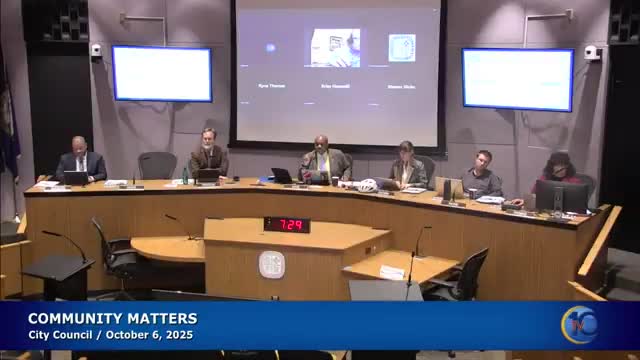Social Services Advisory Board reports rising foster caseloads and SNAP policy changes at council meeting
October 07, 2025 | Charlottesville, Albemarle County, Virginia
This article was created by AI summarizing key points discussed. AI makes mistakes, so for full details and context, please refer to the video of the full meeting. Please report any errors so we can fix them. Report an error »

The Charlottesville Department of Social Services Advisory Board presented its annual report to City Council on Oct. 6, reporting higher foster‑care caseloads, administrative workload increases tied to state and federal changes, and a need for staffing and systems investments.
Sherry Stewart, chair of the advisory board, told council foster care caseloads have increased roughly 50% over the past year and said the department currently has about 108 children in foster care. Stewart said Adult Protective Services reports of neglect or abuse increased and that new state rules are increasing administrative work: redeterminations will occur every six months, and able‑bodied adults receiving SNAP may face new work or community engagement requirements. She said the state‑to‑local funding mix for some benefits is shifting and will increase local fiscal pressure.
The presentation noted Charlottesville’s kinship placement rate — children placed with relatives rather than in foster homes — is about 55%, well above the statewide average. Stewart and Leon Henry (introduced as the department’s new director) praised staff and volunteers and asked council to consider additional staffing resources to meet new requirements while avoiding burnout.
Council members expressed concern about looming policy changes and potential impacts on housing and healthcare access. Deputy City Manager James Friess briefed council on a recent pedestrian fatality and the city’s commitment to rapid safety improvements; that item was presented during the same staff reports portion of the meeting.
Why it matters
Board and staff comments flagged a potential near‑term increase in demand for services and a heavier case management workload for frontline social‑services staff. Council members said they will monitor state policy developments that shift costs and work to identify local mitigation strategies.
Next steps
Staff said the department will continue implementing a new lobby technology system, complete vendor transitions for services paid by the department and seek additional staffing to handle higher intake and redetermination frequency. The advisory board invited residents to apply for vacancies on the board.
Sherry Stewart, chair of the advisory board, told council foster care caseloads have increased roughly 50% over the past year and said the department currently has about 108 children in foster care. Stewart said Adult Protective Services reports of neglect or abuse increased and that new state rules are increasing administrative work: redeterminations will occur every six months, and able‑bodied adults receiving SNAP may face new work or community engagement requirements. She said the state‑to‑local funding mix for some benefits is shifting and will increase local fiscal pressure.
The presentation noted Charlottesville’s kinship placement rate — children placed with relatives rather than in foster homes — is about 55%, well above the statewide average. Stewart and Leon Henry (introduced as the department’s new director) praised staff and volunteers and asked council to consider additional staffing resources to meet new requirements while avoiding burnout.
Council members expressed concern about looming policy changes and potential impacts on housing and healthcare access. Deputy City Manager James Friess briefed council on a recent pedestrian fatality and the city’s commitment to rapid safety improvements; that item was presented during the same staff reports portion of the meeting.
Why it matters
Board and staff comments flagged a potential near‑term increase in demand for services and a heavier case management workload for frontline social‑services staff. Council members said they will monitor state policy developments that shift costs and work to identify local mitigation strategies.
Next steps
Staff said the department will continue implementing a new lobby technology system, complete vendor transitions for services paid by the department and seek additional staffing to handle higher intake and redetermination frequency. The advisory board invited residents to apply for vacancies on the board.
View full meeting
This article is based on a recent meeting—watch the full video and explore the complete transcript for deeper insights into the discussion.
View full meeting
